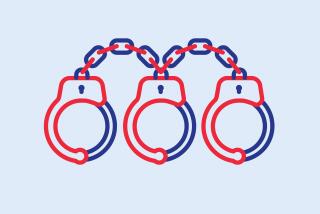Wilson Backs Amendment on Non-Unanimous Juries : Legislation: Governor cites difficulty of obtaining convictions. Proposal would not apply to capital cases.
- Share via
SACRAMENTO — Gov. Pete Wilson said Monday that the O.J. Simpson trial and other sensational California cases have convinced him that criminal convictions are too difficult to obtain and that juries should no longer be required to reach a unanimous decision.
Wilson, speaking to the National District Attorneys Assn. convention in Las Vegas, endorsed a constitutional amendment being considered by the Legislature that would reduce the unanimous jury requirement for a criminal conviction to a 10-2 vote.
The rule, which would not apply to death penalty cases, is necessary because hung juries have clogged the state’s court system, run up a costly bill and caused unnecessary suffering for crime victims, the governor said.
“At present, 10% of all criminal jury trials in my state result in hung juries,” Wilson said. “Some, like the Menendez case, earn headlines, scorn, even ridicule. As you’ve seen in the Simpson case, it’s a question of whether it’s Simpson on trial or the legal system. Clearly it’s both.”
Wilson aides said the governor was not suggesting that Simpson or the Menendez brothers--Erik and Lyle, whose trial on charges of murdering their parents ended in hung juries last year--were guilty. Instead, aides said the cases illustrate how jury behavior has damaged public confidence in the state’s judicial system.
Neither of the two juries deliberating the fates of the Menendez brothers had even 10 votes in favor of a murder conviction.
“We’ve built our jury system on the premise that 12 people--individuals chosen regardless of age, gender, income or race--each will be fair and honorable in their duties,” said Wilson, who is an attorney. “But that’s not always the case. In fact, it has become apparent that to put 12 strangers behind closed doors and expect that not one of them will act unreasonably is no longer a reasonable assumption.”
Wilson told reporters after his speech that Simpson’s case contributed to his decision. “But it’s much broader than that,” he said. “I think that it’s a very serious problem. The most serious aspect of it, in my view, is that public confidence in the criminal justice system is seriously undermined.”
Wilson’s endorsement of the jury change comes early in his nascent bid for the White House, indicating that the governor plans to make crime a major issue in his campaign just as he did during his reelection drive last year.
Then, Wilson campaigned in support of “three strikes” legislation to lengthen sentences of habitual criminals. The governor has also supported various plans that provide more flexibility to police and prosecutors and reduce the appeals available to criminal defendants.
Officially, Wilson’s appearance Monday was handled as a speech by the governor of California--not a presidential candidate. But Wilson alluded to his campaign, noting that he intends to promote his anti-crime proposals nationwide.
“As you may have heard, I have occasion these days to get in front of audiences in places like Des Moines, Iowa, and Manchester, New Hampshire,” Wilson said in a prepared text for his speech. “And there is no single issue in which I take greater pride and satisfaction than the effort I’ve led to lock up career criminals in California. And I say it’s time we took that fight to the rest of America.”
Support for a non-unanimous jury system has grown significantly in California over the last few years, when experts say a number of high-profile cases have shaken confidence in the courts’ integrity.
The proposed constitutional amendment is carried in the Legislature by Assemblyman and former Sheriff Richard K. Rainey (R-Walnut Creek), and it is sponsored by the California District Attorney’s Assn. It is opposed by the American Civil Liberties Union.
Supporters say the impact of a non-unanimous jury has been proven in Louisiana and Oregon, where conviction on a 10-2 decision has been the norm for about 60 years. The U.S. Supreme Court, in a 5-4 decision, upheld the practice in 1973.
Studies have indicated that the non-unanimous jury has not increased conviction rates since most deadlocked panels lean toward acquittal. Supporters of the legislation note that only 3.1% of Oregon’s felony trials end in hung juries, significantly below the national average.
Rainey’s bill was rejected in May on a party-line vote by the Assembly Public Safety Committee. Since the vote, however, control of the committee has switched from Democrats to Republicans. Supporters say the measure will be reconsidered by the committee, and they expect it to pass.
Prospects elsewhere, however, remain uncertain or unfavorable. Because the change requires an amendment to the state Constitution, it must be approved by a two-thirds majority in both the Assembly and Senate. Democrats control the Senate and predicted the effort will fail in their chamber.
After passage by the Legislature and the governor, the proposal would only become law if it is approved by voters. Supporters hope the matter could be placed on the ballot in March or November, 1996.
In his speech, Wilson also attacked President Clinton, challenging him to support changes that speed up death penalty appeals.
“The man most likely to be executed next in California--Keith Daniel Williams--first entered Death Row on April 13, 1979,” the governor said. “That just isn’t right. Old age shouldn’t be the leading cause of death on Death Row.”
More to Read
Get the L.A. Times Politics newsletter
Deeply reported insights into legislation, politics and policy from Sacramento, Washington and beyond. In your inbox twice per week.
You may occasionally receive promotional content from the Los Angeles Times.










